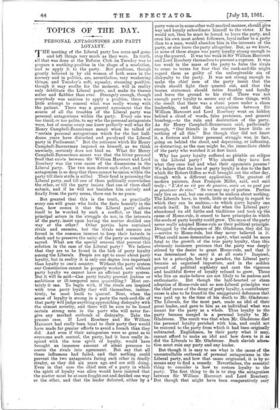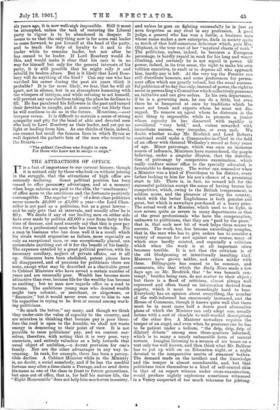TOPICS OF THE DAY.
PERSONAL ANTAGONISMS AND PARTY LOYALTY.
THE meeting of the Liberal party has come and gone, - and left things very much as they were. In truth, all that was done at the Reform Club on Tuesday was to • prepare a soothing-poultice in the shape of a resolution, and to apply it to the party. But poultices, though • greatly believed in by old women of both sexes in the nursery and in politics, are, nevertheless, very weakening • things, and Tuesday's soft, squashy, steaming poultice, • though it may soothe for the moment, will in reality only debilitate the Liberal party, and make its tissues softer and flabbier than ever. Strangely enough. though everybody was anxious to apply a poultice, there was little attempt to conceal what was really wrong with the patient. There was a general agreement that the source of all the troubles of the Liberal party was personal antagonisms within the party. Every one was too timid, or too polite, to say who the personal antagonists were, but of course every one knew perfectly well what Sir Henry Campbell-Bannerman meant when he talked of "certain personal antagonisms which for the last half- dozen years have disturbed and paralysed the Liberal party in Parliament." But the reticence which Sir Henry Campbell-Bannerman imposed on himself, as we think unwisely, certainly does not bind us. What Sir Henry Campbell-Bannerman meant was that the bitter personal feud that exists between Sir William Harcourt and Lord Rosebery was the true cause of the dissensions in the Liberal party. The two men detest each other, and their antagonism is so deep that there cannot be union within the peLrty till their strife is stilled Their feud is poisoning the Liberal party, and till one of them politically overwhelms the other, or till the party insists that one of them shall submit, and if he will not banishes him entirely and finally from the party arena, there can be no peace.
, But granted that this is the truth, as practically every one will grant who looks the facts honestly in the face, how comes it that the Liberal party allows itself to be wrecked by such a conffict, or that the principal actors in the struggle do not, in the interests of the party, insist upon having the matter decided one way or the other ? Other parties have contained rivals and enemies, but the rivals tuid enemies are forced in the common interest to keep their hatreds in check and to preserve the unity of the party as something sacred. What are the special reasons that prevent this solution in the case of the Liberal party? We believe that they are to• be found in the lack of party loyalty among the Liberals. People are apt to sneer about party loyalty, but in reality it is only one degree less important than loyalty to one's country. Without the party system our Constitution cannot be properly worked, and without party loyalty we cannot have an efficient party system. But it will be said—Can party loyalty prevent jealous or ambitious or ill-tempered men quarrelling ? Most cer- tainly it can. To begin with, if the rivals are inspired with true party loyalty they will themselves, instinc- tively, be most loath to quarrel. Next, when the sense of loyalty is strong in a party the rank-and-file of that party will judge anything approaching disloyalty with the utmost severity, and there will be sure to be found certain strong men in the party who will never for- give any marked outbreak of disloyalty. Take the present case. If Lord Rosebery and Sir William Harcourt had really been loyal to their party they would have made far greater efforts to avoid a breach than they did. And even if their antagonism were so great as to overcome such control, the party, had it been really in- spired with the true spirit of loyalty, would have brought an immense amount of silent pressure to coerce the rivals into agreement. But say that all these influences had failed, and that nothing could prevent the two antagonists facing each other in deadly rivalry, as they did six years ago and are still doing. Even in that case the chief men of a party in which the spirit of loyalty was alive would have insisted that the matter must be at once fought out and decided one way or the other, and that the leader defeated, either by a party vote or in some other well-marked manner, should give way and loyally subordinate himself to the victor. If he would not, then he must be forced to leave the party, and even his own most ardent followers, loyal rather to a.party than to a man, would abandon him in the interests of the party, or else leave the party altogether. But, as we know, at none of these stages was party loyalty strong enough to stop the quarrel. It was too weak in Sir William Harcertirt and Lord Rosebery themselves to prevent a rupture. It 'was too weak in the mass of the party to force the rivals to come to terms for fear that the rank-and-file might regard them as guilty of the unforaiveable sin of disloyalty to the party. It was not strong enough to make the chief men of the party insist that the rivals should fight their quarrel out, and that the beaten statesman should retire frankly and loyally and leave the ground to his rival. There was not enough party loyalty to secure any of these things, with the result that there was a sham peace under a sham leadership, and that the antagonism between Sir William Harcourt and Lord Rosebery went on hidden behind a cloud of words, false pretences, and general humbug,—to the ruin and destruction of the party. As Sir Henry Campbell-Bannerman said, pathetically enough, "Our friends in the country know little or nothing of all this." But though they did not blow it, a furious and bitter personal struggle was, in fact, going on behind the cloud, and depressing, or inflaming, or distracting, as the case might be, the immediate chiefs of the party who watched it at first hand.
Why has party loyalty suffered so pitiable an eclipse in the Liberal party ? Why should they have lost what they once had and what their opponents possess ? We believe that the loss of party loyalty is due to the fact which Sir Robert Giffen so well brought out the other day, though with a different application. The greatest of modern painters, Jean Francois Millet, said, and said truly : " L'Art ne vit que de passion, mais on ne peat pas se passioner de rien." So we may say of parties. Parties only live on zeal, but one cannot be zealous about nothing. The Liberals have, in truth, little or nothing in regard -to which they can be zealous,—to which party loyalty can attach itself. In that fatal day when the Liberal party abandoned its old faiths and. traditions and took up the cause of Home-rule, it ceased to have principles in which the seeds of party loyalty could grow. The mass of the party never really adopted Home-rule as their political principle. Drugged by the eloquence of Mr. Gladstone, they did lip —service to Home-rule, but they never believed in it. What could more demoralise a party, what could be more fatal to the growth of the true party loyalty, than this obviously insincere pretence that the party was deeply stirred by the desire to grant Home-rule, and that it was determined to carry it at all costs ? Inspired, not by a principle, but by a paradox, the Liberal party became an organised imposture, and in the sodden ground of political sophistry and cant the vigorous and healthful flower of loyalty refused to grow. Those who live on make-believe are not likely to be zealous and enthusiastic. But though the half-hearted • or sham adoption of Home-rule and so non-Liberal principles was the chief cause of the decay of party loyalty, a contributory cause is also to be found in the exaggerated deference that was paid up to the time of his death to Mr. Gladstone. The Liberals, for the most part, made an idol of their great leader, and gave to him as an individual what was meant for the party as a whole. Thus loyalty to the party became merged in a personal loyalty to Mr. Gladstone. The result was that when Mr. Gladstone died the personal loyalty perished with him, and could not be restored to the party from which it had been originally subtracted. Englishmen, be their party what it may, cannot afford to make an idol and bow down to it as did the Liberals to Mr. Gladstone. Such slavish adorn- tion must ruin any party and any leader.
But though it is easy to see what is the cause of the uncontrollable outbreak of personal antagonisms in the Liberal party, and how that cause originated, it is by no means easy to find a remedy. Nevertheless, the essential thing to consider is how to restore loyalty to the party. The first thing to do is to stop the antagonism between Sir William Harcourt and Lord Rosebery. But though that might have been comparatively easy six years ago, it is now well-nigh impossible. Still it must be attempted. unless the task of restoring the Liberal party to vigour is to be abandoned in despair. It seems to us that the only thing now is for some real leader to come forward, to put himself at the head of the party, and to teach the duty of loyalty to it and to its leader while he remains leader, but not after he has ceased to be leader. If Lord Rosebery would do this, and would make it clear that his care is in no way for himself but only for the general interests of his party, it is still possible that he might rally it and rebuild its broken altars. But is it likely that Lord Rose- bery will do anything of the kind ? Can any one who has watched his career during the past six years think it probable? It is far more likely, we fear, that he will sit apart, not in silence, but in an atmosphere humming with the whispers of intrigue, and while refusing to act himself, will prevent any one else from taking the place he declines to fill. He has paralysed his followers in the past and. turned their devotion to naught, and it seems only too likely that he will continue to do so in the future. Meantime,—sunt lacrymie rerum. It is difficult to restrain a sense of strong sympathy and pity for the band of able and devoted men who look to Lord Rosebery as their leader, and yet get no light or leading from him. As one thinks of them, indeed, one cannot but recall the famous lines in which Byron so well depicted the pathetic fate of the men who trusted to the Stuarts :— " The gallant Cavaliers who fought in vain
For those who knew not to resign or reign."







































 Previous page
Previous page